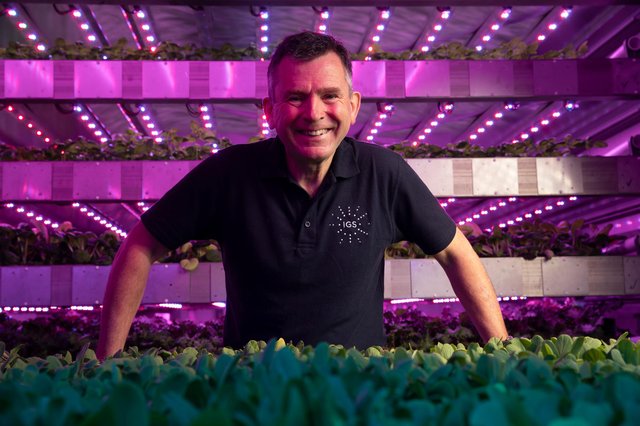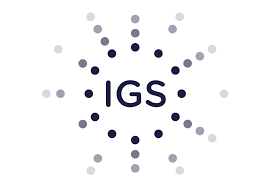David Farquhar is the chief executive of Intelligent Growth Solutions (IGS), which specialises in technology regarding “vertical farming” – growing crops indoors in layers stacked on top of each other.
The Edinburgh-based company was founded in 2013, saying it harnessed decades of farming and engineering know-how “to create an agritech business with a vision to revolutionise the indoor growing market”.
It has since been hailed as a pioneer in helping tackle food shortages and lower food miles, showcasing its wares at COP26 last year, and inking deals with the likes of French urban agriculture firm Jungle.
Mr Farquhar joined IGS as CEO in November 2017, but he originally went to hotel/catering college. That industry “wasn’t for me, so I took the Queen’s shilling and joined the Army,” subsequently graduating from the Royal Military Academy Sandhurst and “accidentally” finding his vocation in life as a leader.
In 1990 he returned home to Scotland, started his first software company, and has since led, invested in, built and sold “or sometimes lost” various early-stage companies, mainly in enterprise software.
2016 saw the sale of private equity(PE)-backed Workplace Systems on a major investment multiple and he retired. The following year, a partner in the PE fund asked him to look at a research-and-development (R&D) project.
“Having never heard of vertical farming, I was reluctant initially, but… when I saw the site, I was blown away. I called some old friends who found it equally enticing, helped me raise Series A and B from the world’s leading agritech venture capitalists – and here we are!”
Can you explain what your role as CEO entails, and why you came out of retirement to join the firm and help drive forward its aim to help feed the world and tackle climate change?
My role is to make sure everyone is super-clear about our long-term vision, our strategic position, our three-year plan, and our mission for the current year. As a trained chef, married to a chef, we are a foodie family and we care about what we eat. As a mountaineer, I am also passionate about the environment, and so these twin obsessions exactly reflect the good our technology can bring to the world.
The Ukraine-Russia conflict is shining a light on the growing food security crisis – how can IGS and the broader agritech sector address the latter issue?
Global food supply chains are just that: global. In fact 72 per cent of everything we consume is grown in a different region or continent, then shipped. This is not sustainable. As a result, agrifood and transport are the two most polluting industries on earth.
We simply must grow more of our food far closer to home and in ways that reduce emissions. This cannot be done with traditional methods alone, due to the restrictions of local weather and climates. We can positively impact some of this by replacing imports of some foods and offering existing farmers the chance to grow their starter plants on-site inside IGS-powered vertical farms.
Can you give more details on how the vertical farming and broader agritech industry complement existing farming methods… for example you’ve highlighted how IGS can help extend the growing day to 18 hours, year-round?
We believe very strongly in the hybrid model described above: start in the vertical farm, then plant out in a field or under glass or poly tunnels. This is not either/or – we are not in competition with farmers.
We can supply them with a whole new set of tools. We are starting to work with our fellow NFU Scotland members to tackle the combined challenges of food security and climate change, whilst creating employment and helping diversify their businesses, including livestock, dairy farmers and foresters.
The ability to create perfect growing-season weather for 18 hours a day hugely shortens the elapsed time needed to grow crops to the point of harvest. For the first time in the 10,000-year history of agriculture, the farmer is in charge of the weather.
At COP26, IGS announced both a partnership with Therme Group to create large-scale urban farms at the latter’s “water-based wellbeing” sites, and a Series B funding round that later closed at £42.2 million and was welcomed by First Minister Nicola Sturgeon. How are these milestones helping accelerate the firm’s growth?
Therme is a global customer for IGS with sites committed for rollout into new city destinations across Europe, North America and eastern Asia. Beyond this, they will grow crops for use in the wellbeing-focused dishes available in their restaurants, and their skincare and beauty products, extending the application of our technology. The range of crops they’ll grow will also extend our overall portfolio.
Our Series B fundraise – concluded in November last year – enables us to complete recruiting for the huge range of skills we need at IGS (almost 60 different roles and counting) but also capacity. 2021 saw a massive leap in sales for us, we were 50 per cent over budget, and we now have around 200 growth towers – the precision-controlled vertical farms we use to grow crops – to deploy across four continents.
In addition, we have a major commitment to invest in R&D on behalf of our customers and to develop globally-leading best practice across engineering, crop science and horticulture.

How was IGS affected by the pandemic, and what is your biggest challenge going forward? And some research has flagged reluctance among consumers to be fully on board with food being grown via less conventionally natural methods – how do you address that?
National lockdowns from the pandemic, combined with Brexit and the invasion of Ukraine, has pushed up prices and slowed down manufacture, as well as affecting supply chains and limiting the availability of components such as steel. It has made it harder to visit export markets, bring potential customers to Scotland to experience our technology first-hand, deploy product, attend live events, recruit, and open offices worldwide.
The consumer reaction question is an interesting one: our partners at the James Hutton Institute [an Invergowrie-based research organisation focused on the sustainable use of land and natural resources] have a social sciences group whose research does not suggest a groundswell of negative reaction.
The US Department of Agriculture has declared food farmed this way to be organic: a new standard is being proposed in the EU to call it “post-organic”. In Japan, China and other heavily urbanised countries, consumers are paying a premium because they perceive food grown outside as far more likely to be polluted. We do not use or plan to use any techniques such as genetic modification – because we control the climate for our farmers, there’s simply no need.
IGS has said it is pursuing its global growth strategy – how is this progressing, for example the company has made announcements regarding developments in Germany, Australia, and the Middle East…
Our job is to support, enable and empower local farmers, wherever we can. When I took over the company, my first decision was that IGS would never grow crop for commercial sale, only for product or crop-development. The investment required to build your own technology at serious international scale is simply too great to deliver economic or shareholder returns.
We are now being sought out by an increasing percentage of well-established growers with significant regional market share. In Germany we are working with property-developers, sustainable-asset investors, and existing growers. In Australia, we are supporting a customer to launch the first entirely solar-powered vertical farm in the country, and in the Middle East our first customer is a large-scale tomato-grower in the United Arab Emirates.
I would also dearly love us to help deliver food security to more of Asia, Latin America and Africa.
More broadly, what are key aims for the firm in the next couple of years – amid IGS being earmarked as a “futurecorn” [fast-growing businesses set to achieve a $1 billion ($764m) valuation]…?
Our sights for now remain firmly focused on delivering for our customers, with growing teams doing so everywhere we sell farms. Of course, we want to continue to expand our sales, geographic coverage, the range and quality of crops, helping guarantee food security and tackle climate change.
Maybe IGS can become a “unicorn” one day and we have extensive employee ownership, but our focus for now is on enabling our crew to achieve the goals we share with our customers, partners and investors.
You say your family comes first in the way you run your life and the decisions you take – not something you often hear CEOs saying… why have you outlined this stance, and how do you approach leadership?
With humility, respect and gratitude. It really does take 15 players to score a try, and one of them is appointed captain: to me that’s simply another role in the team. If I am ever the cleverest person in a meeting, we have a serious recruitment problem.
I also believe in management by walking about, making myself available, and listening. Celebrating success is a great morale-builder, but I encourage people to question what they see, raise concerns, and highlight things they don’t agree with.
As to family, mine is my bedrock and so I see it as part of my duty to place them first because without them I could not do my job: everyone at IGS knows this because I am open about it, and they also know I imagine they will feel the same or have their own version of it. To me that is real leadership.
Source: The Scotsman

